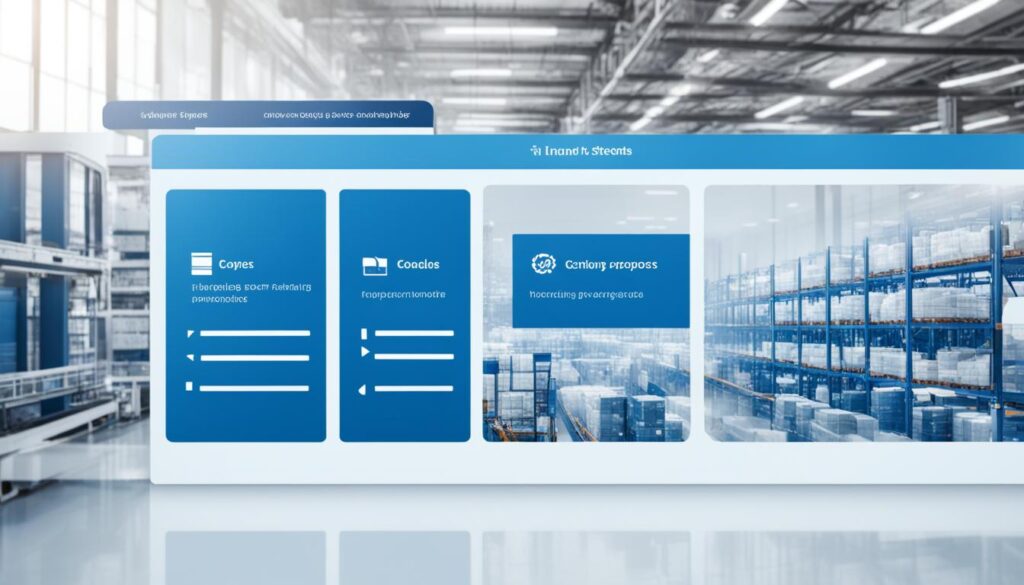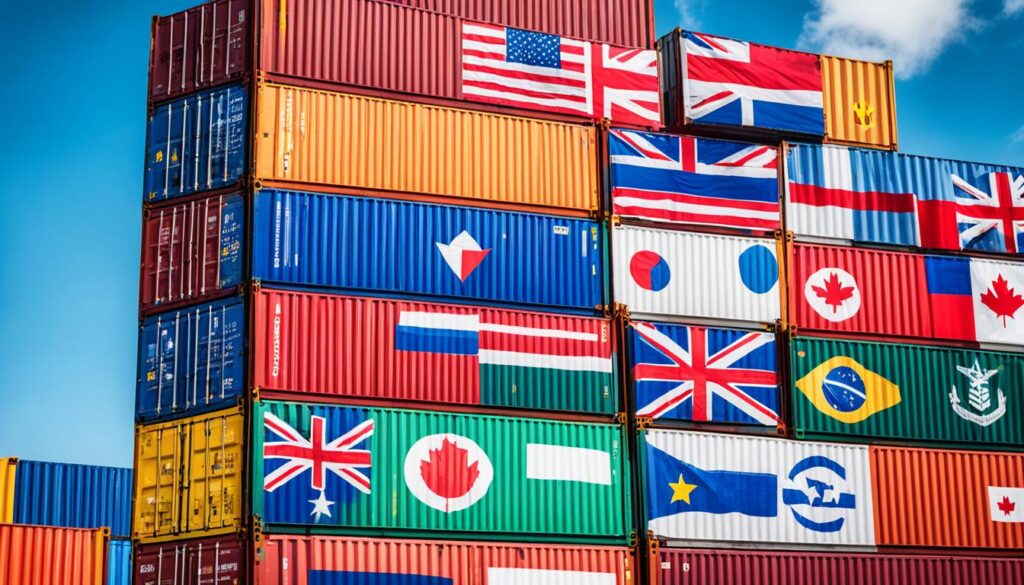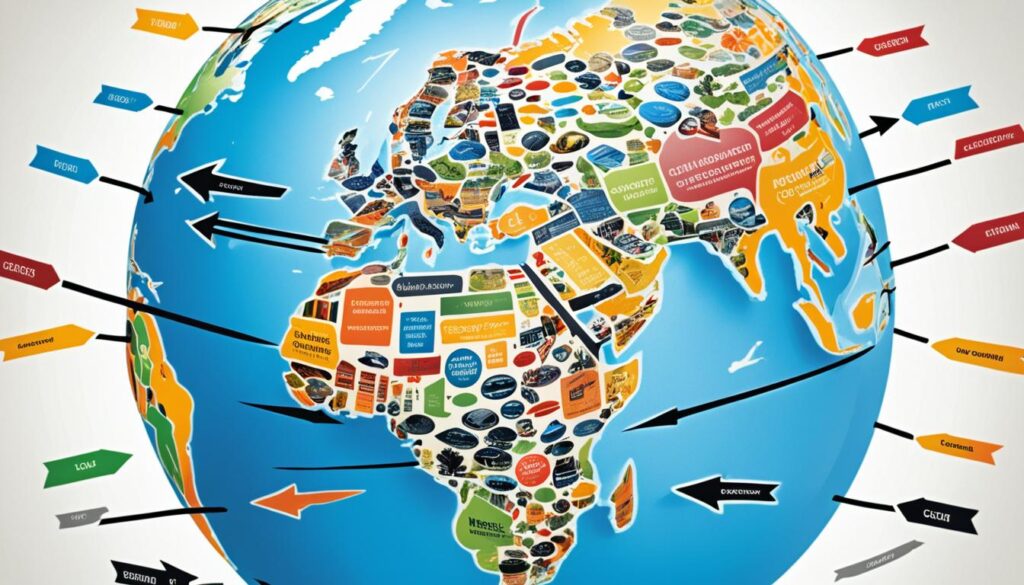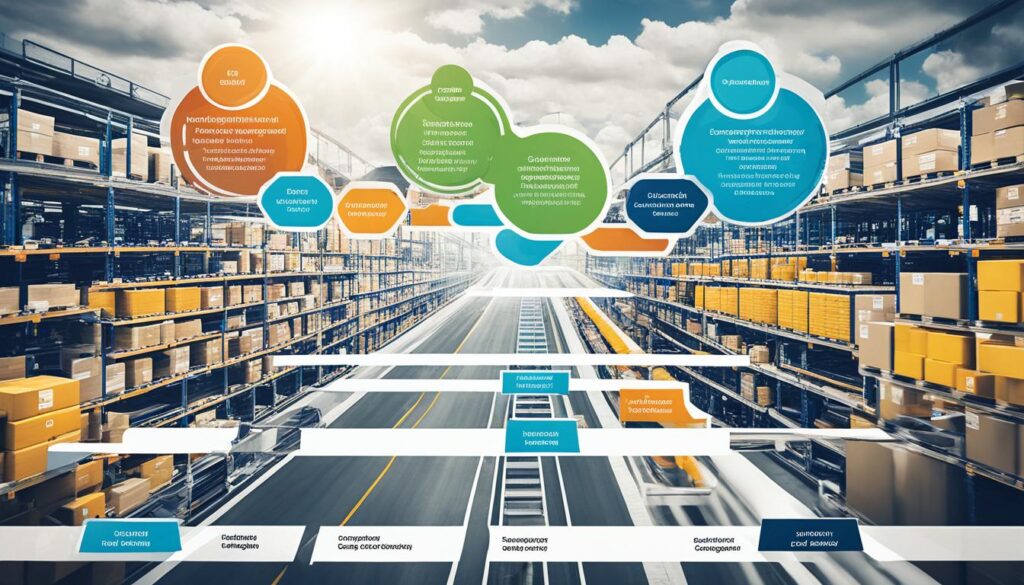When it comes to international trade, tensions and conflicts are inevitable. From trade wars to tariff disputes, the world of global trade is filled with complexities and challenges. But how can businesses successfully navigate these trade disputes and ensure their growth and profitability?
In this article, I will delve into the intricacies of global trade regulations and provide valuable insights and strategies to navigate through the stormy waters of international trade tensions. Whether you’re a small business owner or a seasoned corporate executive, understanding the dynamics of trade disputes is crucial for maintaining a competitive edge in today’s interconnected global economy.
Key Takeaways:
- Global trade disputes are a common occurrence in the international trade landscape.
- Understanding and complying with global trade regulations is essential for businesses to navigate trade disputes effectively.
- Researching and staying updated on trade regulations is vital to adapt to changing trade dynamics.
- Partnering with experienced freight forwarders can streamline shipping processes and ensure compliance with global trade regulations.
- Conducting risk assessments and investing in automation and technology can mitigate potential trade risks.
Understanding Global Trade Regulations
Global trade regulations play a crucial role in shaping the international business landscape. As businesses engage in cross-border transactions, it is imperative to have a comprehensive understanding of the legal frameworks that govern global trade. This section will delve into the key components of global trade regulations, including customs procedures, tariffs, trade barriers, compliance standards, and regulatory norms.
Customs Procedures
Customs procedures are the set of rules and processes that govern the movement of goods across borders. These procedures ensure proper documentation, verification of goods, and adherence to specific regulations. Understanding customs procedures is essential for businesses to expedite clearance, mitigate potential delays, and ensure compliance with import-export requirements.
Tariffs and Trade Barriers
Tariffs are taxes imposed on imports or exports, and they play a significant role in regulating international trade. Knowledge of tariff rates is crucial for businesses to calculate costs accurately and make informed decisions about market entry and pricing strategies. In addition to tariffs, trade barriers such as quotas, embargoes, and subsidies can impact international trade flows and require careful consideration in business planning.
Compliance and Regulatory Standards
Compliance with international regulatory standards ensures that businesses operate within legal boundaries and maintain ethical practices. Compliance obligations may include product safety regulations, environmental policies, labor standards, and intellectual property rights. By understanding and adhering to these standards, businesses can protect their reputation, avoid legal risks, and build sustainable relationships with trading partners.
Having an in-depth understanding of global trade regulations empowers businesses to navigate the complexities of the international market successfully. By staying informed about customs procedures, tariff updates, trade barriers, compliance requirements, and regulatory standards, businesses can make informed decisions, minimize risks, and optimize their global trade operations.

| Benefits of Understanding Global Trade Regulations | Challenges of Navigating Global Trade Regulations |
|---|---|
| 1. Enhanced compliance and risk management | 1. Complex and ever-changing regulatory landscape |
| 2. Accurate calculation of costs and pricing | 2. Potential delays and disruptions due to non-compliance |
| 3. Expanding market opportunities | 3. Trade barriers impacting market access |
| 4. Optimization of international supply chains | 4. Compliance with diverse regulatory requirements |
Researching and Staying Updated on Trade Regulations
Regularly monitoring global trade regulations is crucial for businesses to stay informed about changes in customs procedures, tariffs, and compliance requirements. By staying updated, businesses can effectively adapt their strategies and ensure compliance with the ever-evolving landscape of international trade.
When it comes to staying informed, there are several reliable sources that businesses can rely on. Government websites are a valuable resource for accessing the latest information on trade regulations and policy changes. These websites often provide detailed guidelines, forms, and updates that businesses can use to navigate customs procedures and compliance requirements.
Trade publications are another great source of information for staying updated on global trade regulations. These publications offer insights, analysis, and expert commentary on emerging trends, shifts in trade policies, and regulatory updates. Subscribing to reputable trade publications ensures that businesses receive timely and relevant information directly in their inbox.
Industry associations such as the World Trade Organization (WTO) and the International Chamber of Commerce (ICC) are also invaluable resources for businesses seeking to stay updated on global trade regulations. These organizations provide guidance, best practices, and advocacy on issues related to international trade. By actively engaging with these associations, businesses can gain access to a network of experts and stay informed on the latest developments in trade regulations.
The Benefits of Partnering with Experienced Freight Forwarders
Partnering with experienced freight forwarders is an effective way for businesses to stay updated and compliant with global trade regulations. Freight forwarders are industry experts who specialize in managing the logistical aspects of international trade, including customs procedures, tariffs, and compliance requirements.
By working with freight forwarders, businesses can leverage their expertise and knowledge of global trade regulations to streamline their operations. These professionals have a deep understanding of customs procedures and can navigate complex documentation requirements on behalf of businesses. They also stay updated on changes in tariffs and compliance requirements, ensuring that businesses remain in adherence to the latest regulations.
Moreover, freight forwarders can provide valuable guidance and insights on specific market requirements, helping businesses develop tailored strategies for different regions. They can also assist in assessing potential risks and ensure that the necessary compliance measures are in place to mitigate any disruptions or penalties.
Additionally, freight forwarders often have access to advanced automation tools and technology solutions that can enhance efficiency in managing trade regulations. Automated systems can help businesses stay organized, track compliance requirements, and ensure smooth communication with customs authorities.
Partnering with experienced freight forwarders not only helps businesses stay updated on trade regulations but also provides them with a competitive edge in the global market.
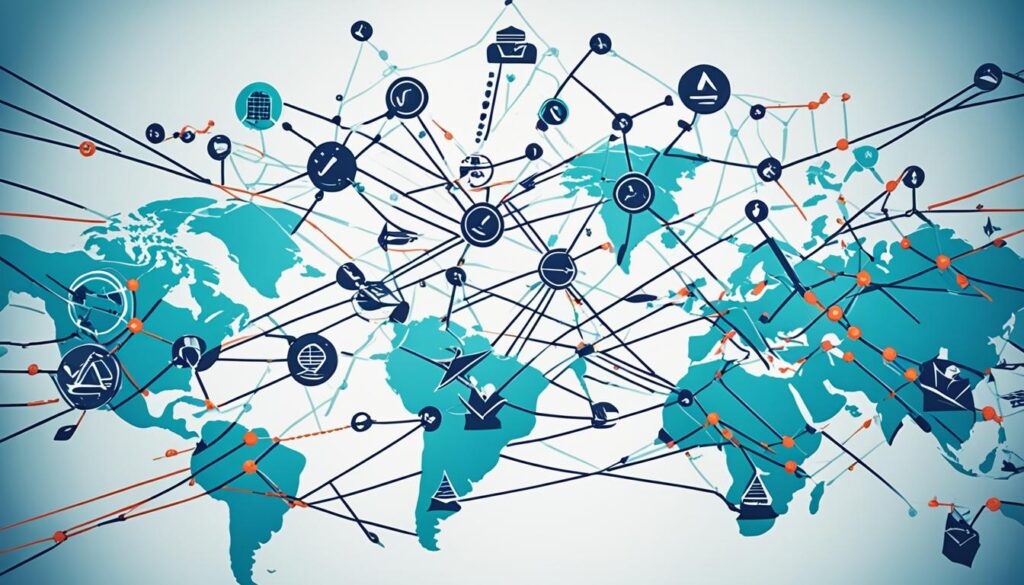
Key Sources for Staying Updated on Global Trade Regulations
| Source | Description |
|---|---|
| Government Websites | Official platforms providing regulatory information, guidelines, and updates on customs procedures, tariffs, and compliance requirements. |
| Trade Publications | Industry-specific magazines, journals, and newsletters offering insights, analysis, and expert commentary on global trade regulations. |
| Industry Associations | Organizations such as the World Trade Organization (WTO) and the International Chamber of Commerce (ICC) providing guidance, best practices, and advocacy on international trade. |
Staying updated on trade regulations is an ongoing endeavor, as global trade dynamics continue to evolve. By leveraging reliable sources and partnering with experienced freight forwarders, businesses can navigate the complexities of global trade regulations with confidence and ensure compliance with customs procedures, tariffs, and compliance requirements.
Partnering with Experienced Freight Forwarders
When it comes to navigating the complexities of global trade regulations and ensuring compliance, businesses can greatly benefit from partnering with experienced and reputable freight forwarders. These experts play a vital role in streamlining shipping processes and providing guidance on specific requirements in different markets.
Freight forwarders have extensive knowledge of global trade regulations, including customs procedures, tariffs, and compliance standards. By leveraging their expertise, businesses can ensure smooth and efficient shipping operations while remaining in full compliance with international trade laws.
One of the key advantages of working with freight forwarders is their ability to navigate the intricacies of various global markets. They possess a deep understanding of the unique requirements and regulations in different countries, allowing businesses to navigate through potential pitfalls and avoid costly compliance mistakes.
Additionally, freight forwarders can offer guidance and assistance in documentation preparation, ensuring that all necessary paperwork is completed accurately and in a timely manner. This attention to detail can help minimize delays and prevent costly penalties or fines.
Moreover, freight forwarders have established networks and partnerships with carriers, customs officials, and other industry stakeholders. This extensive network allows them to negotiate favorable shipping rates, expedite customs clearance, and provide real-time tracking and visibility of shipments. Their strong industry connections can be incredibly valuable in streamlining the entire shipping process.
Benefits of Partnering with Freight Forwarders:
- Expertise and Knowledge: Freight forwarders have in-depth knowledge of global trade regulations and can guide businesses through complex compliance requirements.
- Market-specific Guidance: With their understanding of local regulations, freight forwarders can offer tailored guidance for specific markets, ensuring smooth operations.
- Efficient Documentation: Freight forwarders assist with accurate and timely documentation, minimizing delays and avoiding compliance errors.
- Extensive Network: Their established relationships with carriers, customs officials, and industry partners help businesses access cost-effective shipping solutions and expedite customs processes.
- Real-time Visibility: Freight forwarders provide advanced tracking and visibility tools, allowing businesses to monitor their shipments from origin to destination.
Overall, partnering with experienced freight forwarders is a strategic decision for businesses aiming to navigate the complexities of global trade regulations while optimizing shipping processes. Their expertise, market-specific guidance, and extensive network can provide invaluable support and peace of mind in a rapidly evolving international trade landscape.

Conducting Risk Assessments
Performing thorough risk assessments is essential in navigating the complexities of global trade. By conducting comprehensive risk assessments, businesses can identify potential compliance risks and challenges that may arise in the international trade landscape.
One crucial aspect to consider during risk assessments is the presence of trade restrictions, sanctions, and embargoes imposed by specific countries or regions. These trade barriers can significantly impact a company’s operations and hinder its ability to conduct business seamlessly.
To mitigate these risks, it is vital for businesses to develop robust contingency plans that outline alternative strategies and courses of action. Contingency plans allow companies to adapt and respond effectively to changing trade dynamics, enabling them to continue operations while minimizing disruptions.
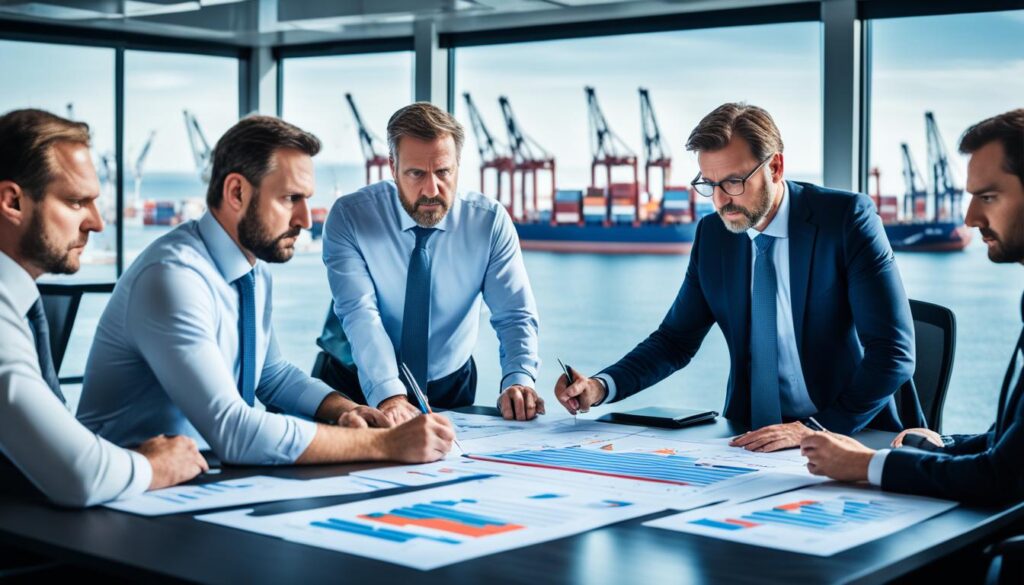
Risk Assessment Checklist:
- Identify potential compliance risks and challenges in the global trade landscape.
- Determine the impact of trade restrictions, sanctions, and embargoes on your operations.
- Stay up-to-date with regulatory changes and developments in the countries or regions you operate in.
- Evaluate the effectiveness of your current compliance processes and procedures.
- Conduct internal audits to identify areas of improvement.
- Develop contingency plans that outline alternative strategies and courses of action.
Effective risk assessments provide businesses with valuable insights into potential compliance risks and challenges, allowing them to develop proactive strategies and contingency plans that ensure smooth operations in the face of trade disputes.
Investing in Automation and Technology
Embracing automation and technology solutions is essential for businesses aiming to optimize their customs documentation processes, meet compliance requirements, and gain supply chain visibility. By leveraging the power of automation and technology, companies can streamline their operations, reduce manual errors, and enhance overall efficiency.
One example of such technology is customs management software, which enables organizations to efficiently manage and track the movement of goods across borders. This software automates various tasks such as document preparation, duty calculation, and customs filing, minimizing the risk of errors and delays in customs documentation.
Automation and technology solutions can streamline customs documentation, track compliance requirements, and provide real-time visibility into the supply chain.
Another technology that revolutionizes trade operations is electronic data interchange (EDI), which allows for the seamless exchange of standardized electronic documents between trading partners. By implementing EDI systems, businesses can accelerate document processing, enhance data accuracy, and improve collaboration with their supply chain partners.
Cloud-based logistics platforms also play a pivotal role in driving efficiency and transparency in international trade. These platforms offer real-time visibility into the supply chain, allowing businesses to track the movement of goods, monitor inventory levels, and anticipate potential disruptions. With supply chain visibility, companies can proactively address issues, optimize inventory management, and improve overall customer satisfaction.
Investing in automation and technology not only streamlines operations but also helps businesses stay compliant with evolving customs regulations and compliance requirements. With automated processes and real-time data, organizations can ensure that they adhere to the necessary customs procedures and meet the ever-changing compliance standards.
Advantages of Investing in Automation and Technology:
- Streamlines customs documentation processes
- Reduces manual errors and delays
- Enhances overall operational efficiency
- Improves supply chain visibility
- Facilitates compliance with customs regulations
With the rapid advancements in automation and technology, businesses that fail to adapt may risk falling behind their competitors. By embracing these tools, organizations can gain a competitive edge in the global market, drive growth, and ensure long-term success in international trade.
Key Features of Automation and Technology Solutions
| Feature | Description |
|---|---|
| Customs Management Software | Automates customs documentation processes, duty calculation, and customs filing |
| Electronic Data Interchange (EDI) | Enables seamless electronic document exchange between trading partners |
| Cloud-Based Logistics Platforms | Provides real-time visibility into supply chain, tracking, and inventory management |
By leveraging the power of automation and technology solutions, businesses can navigate the complexities of customs procedures with ease, meet compliance requirements accurately and efficiently, and drive supply chain visibility, ultimately unlocking new opportunities and achieving sustainable growth.
Collaborating with Customs Brokers and Legal Experts
When it comes to navigating the complex world of global trade regulations, collaborating with customs brokers and legal experts is essential. These professionals possess in-depth knowledge of local regulations, ensuring customs compliance, documentation accuracy, and effective dispute resolution.
Customs brokers are licensed professionals who specialize in customs procedures and regulations. They have extensive experience in handling import and export processes and can assist businesses in navigating the intricacies of customs compliance. By leveraging their expertise, businesses can streamline their customs procedures, minimize delays, and avoid penalties or fines.
Legal experts are invaluable resources for businesses seeking guidance in complying with international trade regulations. They have a deep understanding of the legal frameworks governing global trade and can provide advice on matters such as trade barriers, tariffs, and compliance with local regulations.
Engaging customs brokers and legal experts offers several benefits. Firstly, they can provide valuable advice and guidance throughout the trade process, ensuring businesses meet all regulatory requirements. This includes assistance with customs documentation, tariff classification, and understanding the local regulations specific to each market.
In addition, customs brokers and legal experts can help resolve trade disputes effectively. They possess the knowledge and expertise to navigate complex trade issues, negotiate with authorities, and seek amicable resolutions. In case of disputes, they can offer dispute resolution strategies that are in line with local regulations and international trade laws.
By collaborating with customs brokers and legal experts, businesses can ensure customs compliance, minimize risks, and streamline their trade operations. They play a crucial role in helping businesses navigate the often intricate landscape of global trade regulations, providing the necessary expertise and support for successful cross-border transactions.

In the following table, we outline the key benefits of collaborating with customs brokers and legal experts:
| Benefits | Explanation |
|---|---|
| Expert Knowledge | Customs brokers and legal experts possess in-depth knowledge of local regulations, ensuring compliance and accurate documentation. |
| Efficient Customs Procedures | Customs brokers can help streamline customs procedures, minimizing delays and avoiding penalties or fines. |
| Dispute Resolution | Legal experts can provide guidance on resolving trade disputes effectively, ensuring compliance with local regulations and international trade laws. |
| Risk Mitigation | Collaborating with customs brokers and legal experts helps minimize risks associated with customs compliance and trade operations. |
The Role of Investor-State Dispute Settlement (ISDS) in International Investments
Investor-State Dispute Settlement (ISDS) plays a pivotal role in the resolution of conflicts arising between investors and host states in the realm of international investments. It serves as a vital tool that provides investors with a platform to seek redress under international law, ensuring fair treatment and the protection of their investments.
ISDS essentially functions as a form of investment dispute resolution, encompassing multiple methods such as negotiation, mediation, arbitration, and litigation. Through these mechanisms, ISDS enables the parties involved to engage in a structured process that aims to address conflicts and reach a resolution.
By allowing for negotiation, ISDS encourages the parties to engage in open dialogue and find common ground, potentially resolving the dispute through mutual agreement. In cases where negotiation proves insufficient, mediation can be employed as an alternative method. Here, a neutral mediator facilitates discussions between the parties, guiding them towards an amicable resolution.
If the dispute cannot be resolved through negotiation or mediation, ISDS offers the option of resorting to arbitration, where an impartial tribunal makes a binding decision based on the arguments and evidence presented by both sides. Litigation, on the other hand, involves bringing the dispute before a court of law for a final ruling.
ISDS serves as a critical framework that helps maintain stability and trust in the international investment landscape. It ensures that investors have recourse to a fair and transparent dispute resolution mechanism, thus safeguarding their interests and fostering confidence in cross-border investments.
Benefits of ISDS include:
- Providing investors with a platform to seek redress and protection under international law
- Encouraging negotiation and mediation as a means to reach mutually beneficial resolutions
- Offering a binding decision through arbitration when other methods fail to resolve the dispute
- Promoting transparency, fairness, and accountability in resolving conflicts
“Investor-State Dispute Settlement ensures that investors have access to a fair and impartial process that upholds their rights and safeguards their investments.”
Understanding the role of ISDS in international investments is crucial for both investors and host states. It provides a framework for conflict resolution that contributes to a stable and conducive investment environment, facilitating economic growth and global collaboration.
The table below highlights the key features of ISDS:
| Feature | Description |
|---|---|
| Multiple Methods | Includes negotiation, mediation, arbitration, and litigation |
| Impartiality | Ensures a fair and unbiased resolution process |
| Legal Framework | Governed by international investment agreements and treaties |
| Transparency | Provides visibility into the dispute resolution process |
| Enforceability | Allows for the enforcement of decisions across jurisdictions |
Different Methods of Dispute Resolution in International Trade
When it comes to resolving disputes in international trade, there are various methods available, each with its own advantages and suitability for different circumstances. These methods include negotiation, mediation, arbitration, and litigation. Let’s take a closer look at each of these dispute resolution methods:
Negotiation:
Negotiation is a voluntary and consensual process where parties in a dispute engage in discussions and attempt to find a mutually acceptable solution. It allows for direct communication and can often preserve business relationships. However, negotiation requires cooperation and goodwill between the parties involved.
Mediation:
Mediation is a facilitated negotiation process that involves the assistance of a neutral third party called a mediator. The mediator helps the parties communicate, identify common interests, and explore potential solutions. Mediation promotes collaboration and can lead to creative and mutually satisfactory outcomes.
Arbitration:
Arbitration is a more formal process where parties present their arguments and evidence to a neutral arbitrator or panel of arbitrators. The arbitrator(s) then renders a binding decision, known as an arbitral award. Arbitration offers a confidential and efficient alternative to litigation but involves the surrender of control over the outcome to the arbitrator(s).
Litigation:
Litigation is the process of resolving disputes through the court system. It involves filing a lawsuit, presenting evidence, and having a judge or jury make a binding decision. Litigation can be time-consuming, costly, and confrontational, but it provides a structured legal framework and the ability to enforce judgments.
Each of these dispute resolution methods has its own advantages and considerations. Businesses should carefully evaluate their specific situation and objectives to determine the most appropriate approach for resolving their international trade disputes.
| Dispute Resolution Method | Advantages | Considerations |
|---|---|---|
| Negotiation | – Can preserve business relationships – Allows for direct communication |
– Requires cooperation and goodwill between the parties – Relies on the willingness of parties to reach a resolution |
| Mediation | – Encourages collaboration and creativity – Assisted by a neutral third party |
– Non-binding outcome – Dependent on the willingness of parties to engage in the process |
| Arbitration | – Confidential and efficient – Expert decision-maker(s) |
– Surrender of control over the outcome – Limited grounds for appeal |
| Litigation | – Provides a structured legal framework – Enables enforcement of judgments |
– Time-consuming and costly – Confrontational process |
Choosing the right dispute resolution method is crucial for effectively and efficiently resolving international trade disputes. It is important to consider the nature of the dispute, the desired outcome, and the available resources when deciding which approach to pursue.
The Significance of Mediation in Investor-State Disputes
Mediation is a crucial process in resolving investor-state disputes, offering a pathway to collaborative resolution and sustainable solutions. In such disputes, involving investors and host states, mediation plays a vital role in fostering cooperation and facilitating mutually beneficial outcomes. Through the guidance of a neutral mediator, the parties involved are encouraged to seek common ground and find innovative solutions to their differences.
Unlike other dispute resolution methods, mediation promotes understanding and encourages dialogue between the parties, emphasizing cooperative problem-solving rather than adversarial confrontation. It provides a platform for open communication and facilitates the exploration of creative options, ensuring that the interests of both the investor and the host state are taken into account.
Additionally, mediation offers a flexible and confidential environment where the parties can express their concerns, share information, and engage in constructive dialogue. By encouraging active participation and collaboration, mediation helps to preserve and enhance relationships between investors and host states, enabling them to move forward with a renewed sense of trust and shared objectives.
The significance of mediation in investor-state disputes cannot be overstated. It is a powerful tool for achieving sustainable solutions that promote economic growth, protect investments, and foster harmonious international relations. By embracing mediation as a preferred method of dispute resolution, investors and host states can navigate complex legal landscapes with mutual respect, trust, and a commitment to finding equitable outcomes.

